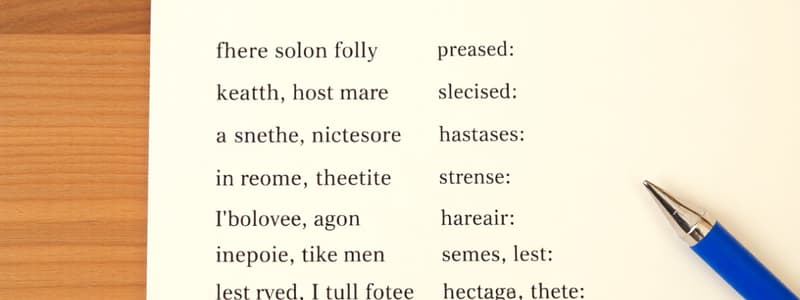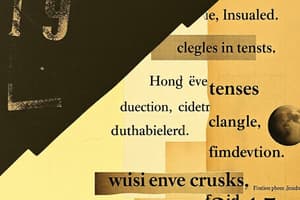Podcast
Questions and Answers
Which of the following sentences is an example of simple past tense?
Which of the following sentences is an example of simple past tense?
- I will help my neighbor tomorrow.
- I am helping my neighbor right now.
- I helped my neighbor yesterday. (correct)
- I have helped my neighbor too much this week.
Identify the example of future perfect continuous tense.
Identify the example of future perfect continuous tense.
- I had been helping my neighbor for a year.
- I will be helping my neighbor next month.
- I help my neighbor every day.
- I will have been helping my neighbor for a year next month. (correct)
What is the primary use of present tense?
What is the primary use of present tense?
- To indicate future actions.
- To describe actions that are completed.
- To express habitual actions or states that currently exist. (correct)
- To describe actions that occurred at a specific time in the past.
Which option represents the perfect continuous tense in present form?
Which option represents the perfect continuous tense in present form?
Which of the following is an example of simple future tense?
Which of the following is an example of simple future tense?
What is the correct structure for the Past Perfect tense?
What is the correct structure for the Past Perfect tense?
Which example correctly represents the Past Continuous tense?
Which example correctly represents the Past Continuous tense?
Which of the following sentences is in the Past Perfect Continuous tense?
Which of the following sentences is in the Past Perfect Continuous tense?
What is the V2 form of the verb 'to go' used in the Simple Past tense?
What is the V2 form of the verb 'to go' used in the Simple Past tense?
Which rule correctly describes the Simple Past tense?
Which rule correctly describes the Simple Past tense?
What is the structure of the simple present tense for singular subjects?
What is the structure of the simple present tense for singular subjects?
Which of the following is the correct structure for present perfect continuous tense?
Which of the following is the correct structure for present perfect continuous tense?
Which example demonstrates the present continuous tense?
Which example demonstrates the present continuous tense?
In the present perfect tense, what is the correct form for plural subjects?
In the present perfect tense, what is the correct form for plural subjects?
Identify the verb form used in the present perfect tense.
Identify the verb form used in the present perfect tense.
What characterizes the present perfect continuous tense?
What characterizes the present perfect continuous tense?
Which of the following sentences is an example of the present perfect tense?
Which of the following sentences is an example of the present perfect tense?
How is the simple present tense structured for plural subjects?
How is the simple present tense structured for plural subjects?
Flashcards are hidden until you start studying
Study Notes
Simple Present Tense
- Structure: Subject + V1 + s/es + Object (singular); Subject + V1 + Object (plural)
- Singular Example: "The girl sings a song" (s added to "sing")
- Plural Example: "The girls sing a song" (no change to "sing")
Present Continuous Tense
- Structure: Subject + is/am/are + V1 + ing + Object
- Example: "She is eating food" (is + "eating" formed by adding "ing" to "eat")
Present Perfect Tense
- Structure: Subject + has/have + V3 + Object
- Singular Example: "He has cleaned the utensils" (has + "cleaned" as V3)
- Plural Example: "They have cleaned the utensils" (have + "cleaned" as V3)
Present Perfect Continuous Tense
- Structure: Subject + has/have been + V1 + ing + Object
- Singular Example: "She has been practising since morning" (has been + "practising")
- Plural Example: "They have been practising since morning" (have been + "practising")
Past Tense Overview
- Refers to actions/events that occurred in the past
- Divided into three main categories: Present, Past, and Future Tense
- Each category further divided into: Simple, Continuous, Perfect, and Perfect Continuous
Past Tense Structures
-
Simple Past Tense: Subject + V2 + Object
- Example: "He ran away" (V2 of "run" is "ran")
-
Past Continuous Tense: Subject + was/were + V1 + ing + Object
- Singular Example: "She was going shopping" (was + "going")
- Plural Example: "They were going shopping" (were + "going")
-
Past Perfect Tense: Subject + had + V3 + Object
- Example: "Sumit had left the job" (had + V3 of "leave" is "left")
-
Past Perfect Continuous Tense: Subject + had been + V1 + ing + Object
- Example: "They had been preparing for their performance for two months" (had been + "preparing")
Future Tense Overview
- Captures actions/events that will occur in the future
- Similar structure breakdown into: Simple, Continuous, Perfect, and Perfect Continuous
This summary encapsulates the essential grammatical rules and examples of tenses in English, providing a clear reference for students studying English grammar.
Studying That Suits You
Use AI to generate personalized quizzes and flashcards to suit your learning preferences.




